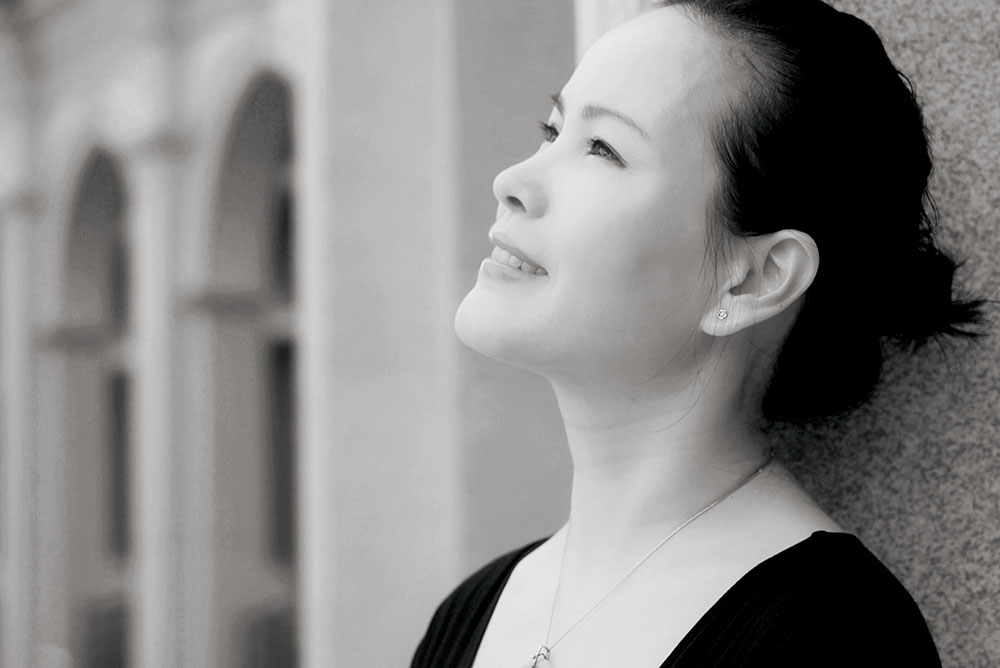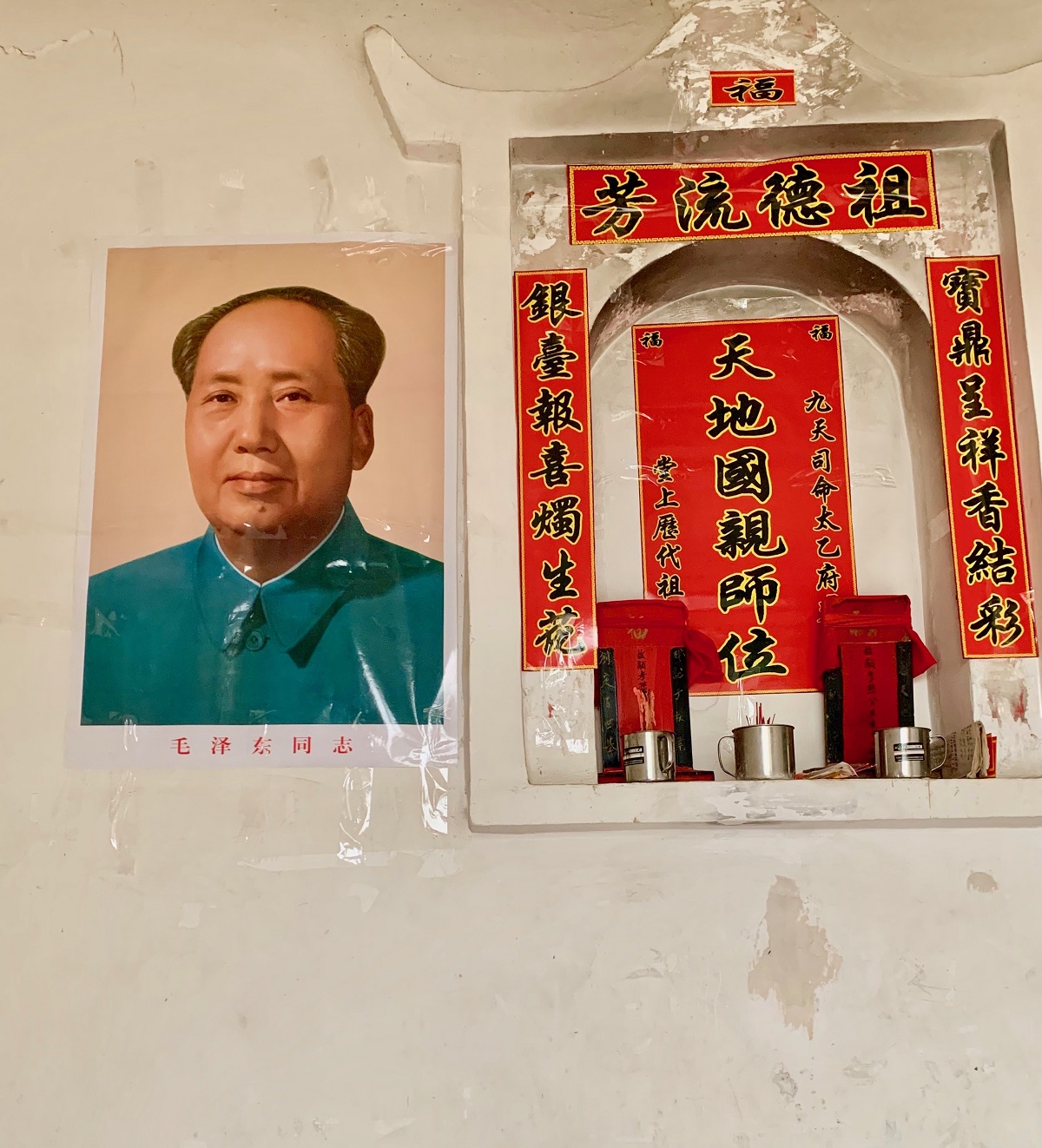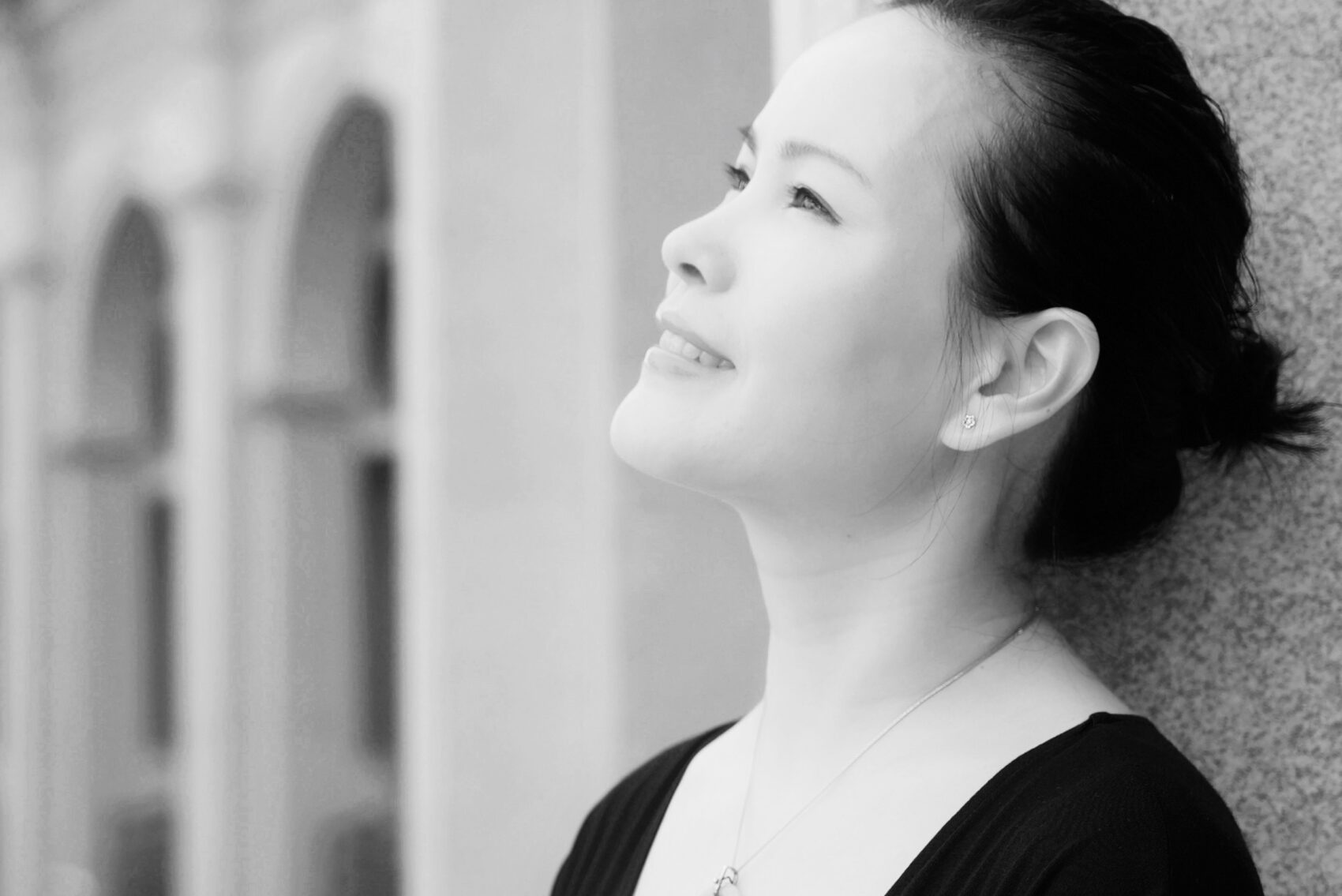日常生活中的政治问题
记得小时候我家堂屋里(城里人称作客厅)的墙上总是贴着一些廉价印刷画,比如十大开国元帅,比如财神,但正墙上总是被一幅巨大的毛泽东像占据,他脑袋后的太阳闪烁金色光芒,不过那时候还没有人将其与神灵及祖先牌位一起祭拜,只不过是像张贴年画那样的一种普通习俗,家家都有,并没有特殊对待。所以主席画像即便是被炊烟熏得污黑,或者半边画毁坏飘挂都没人在意。
我离开家乡二十多年,几乎每年春节都回乡探亲,我注意到其中有些年头墙壁上没有毛主席像,但近些年忽然又挂了起来,并且由于电脑和印刷术的发达,画像质量越做越好,不怕风吹雨打手也撕不烂。记得那年回家照例在长沙下飞机坐的士,司机车前挂着镶嵌精致垂着流苏的毛主席像,说是辟邪保平安——我已经听说每天都有来自全国各地的游客在毛泽东故居上千人聚首痛哭,此后也专程驱车去亲眼见证了这一幕,惊愕莫名。
我回家一进门就看到神龛边贴着大幅主席图,借搞大扫除之际撕了扔进垃圾桶。父母当时没有说什么,但看得出来他们为此很不高兴。是我自己意识到撕画的举动是在干预他们的情感与自由,甚至算得上冒犯。我离家多年不过是这个家庭短暂的归客,撕画是粗鲁的行为,我应该采取更温和的方法告诉他们,关于这件事我是怎么想的。我可以跟他们说说大饥荒的尸横遍野与文化大革命的血流成河,我也可以告诉他们杨继绳先生的《墓碑》提供了什么史料,荷兰历史学家冯客先生的《毛泽东时代的大饥荒》写了什么……可是真相过于荒谬他们不一定会信,所以最终我什么也没说。次年再度回家,看到崭新的主席图像工工整整的贴在老地方,我没再撕下它,而是拿出手机拍下这张照片。不知为什么,我心里忽然产生一种深深的悲伤与怜悯。
Die politischen Fragen des alltäglichen Lebens
Ich erinnere mich, dass in meiner Kindheit im Hauptraum unseres Hauses (den die Städter „Wohnzimmer“ nennen) immer irgendwelche billigen Drucke an der Wand klebten, zum Beispiel die Zehn Marschälle oder der Gott des Reichtums. Die Hauptwand wurde allerdings durchgehend von einem großen Portrait Mao Zedongs eingenommen. Golden glänzten hinter ihm die Strahlen der Sonne. Aber damals dachte noch niemand daran, ihm wie den Göttern und Ahnen Opfergaben darzubringen. Es war einfach ein Brauch wie das Neujahrsbild, alle hatten eines, und es wurde nicht irgendwie besonders behandelt. Es kümmerte darum auch keinen, wenn das Antlitz des Großen Vorsitzenden in den Küchendünsten langsam ergraute oder wenn er auf der einen Seite bereits halb in Fetzen von der Wand hing.
Ich habe mein Dorf vor über zwanzig Jahren verlassen. Beinahe jedes Jahr habe ich meine Familie zum Frühlingsfest besucht, und dabei ist mir aufgefallen, dass der Große Vorsitzende für einige Jahre von der Wand verschwunden war, zuletzt jedoch plötzlich wieder dort auftauchte und das, Dank der fortschrittlichen Drucktechnologie, in besserer Qualität als jemals zuvor: allen widrigen Umständen trotzend, beinahe reißfest gar. Ich erinnere mich, dass in einem Jahr, als ich wie üblich in meine Heimat zurückkehrte und auf dem Weg von Changsha aus dem Flugzeug und in ein Taxi stieg, vorne im Wagen meines Fahrers ein Bild Mao Zedongs hing, hübsch eingefasst in Quasten. Er sagte, dass es das Böse abwehren sollte. Ich hatte schon vorher davon gehört, dass täglich Touristen aus dem ganzen Land zu Maos früherem Wohnsitz pilgerten und sich dort versammelten, um gemeinsam zu trauern, aber als wir dann später extra daran vorbeifuhren, damit ich es mit meinen eigenen Augen sehen konnte, war ich doch unglaublich erstaunt.
Kaum war ich zu Hause angekommen und eingetreten, war mein Blick auf ein großformatiges Bild des Vorsitzenden gefallen, das dort gleich neben dem Schrein hing. Mit einem Schwung riss ich es ab und warf es in den Mülleimer. Meine Eltern sagten nichts, aber es war offensichtlich, dass sie darüber nicht sehr glücklich waren. Mit meiner eigenmächtigen Handlung hatte ich ihre Freiheit und ihre Gefühle verletzt, so sehr, dass es einem Affront gleichkam. Ich hatte dieses Haus schon vor vielen Jahren verlassen, war hier nur kurz zu Gast, da war ein Bild von der Wand zu reißen schon ein sehr rüdes Verhalten. Ich hätte ihnen wohl anders beibringen können, wie ich darüber dachte. Ich hätte mit ihnen über die große Hungersnot sprechen können, als überall Leichen lagen, oder über das Blutvergießen während der Kulturrevolution, ich hätte ihnen auch von den Materialen erzählen können, die Yang Jisheng in »Tombstone« gesammelt hatte, oder davon, was der niederländische Historiker Frank Dikötter in »Maos großer Hunger« schreibt – egal, die Fakten sind so absurd, dass meine Eltern mir ohnehin sehr wahrscheinlich nicht geglaubt hätten. Also sagte auch ich letzten Endes nichts. Als ich sie im Jahr darauf wieder besuchte, hing dort an derselben Wand, fein säuberlich aufgeklebt, ein nagelneues Bild des Vorsitzenden an seinem angestammten Platz. Ich habe es nicht wieder heruntergerissen. Stattdessen habe ich mein Telefon herausgezogen und ein Foto davon gemacht. Ich weiß nicht warum, aber auf einmal war mein Herz erfüllt von tiefem Kummer und Mitgefühl.
Übersetzung: Cornelia Travnicek
Political Issues of Every-day Life
I still have this childhood memory of cheap print paintings hung on the walls of our house’s central room (city people call it “living room”), like The Ten Marshals of the People’s Republic of China and the God of Wealth. The one always occupying the most prestigious position on our central wall was a massive portrait of Mao Zedong with a bright golden sun glowing behind his head. However, even at that time he was never worshiped like gods and ancestors. It was only a common habit just like hanging Chinese New Year pictures. Every family did it, but there was no special treatment towards it. Hence, even if Chairman Mao’s picture was blackened by the smoke from the ovens or half damaged, nobody actually cared.
It’s been over twenty years since I left my hometown, but I still get back almost every year to spend the Spring Festival with my family. I noticed that for a few years there was no Chairman Mao’s portrait on the wall, but in my most recent visits there it was again; and given the technological improvements of computer printing, the quality of the portrait was getting even better. No wind or rain could easily damage it, even ripping it apart by hand had become harder.
I remember one time I was going back to my hometown, as usual, and after arriving at the Changsha Airport I decided to get a taxi home. The driver had a very intricately decorated portrait of Chairman Mao hung on his rear-view mirror, and he said it was a talisman to guard him against evil spirits.
I had once heard that every day thousands of people from all over the country gather at Mao Zedong’s former residence to cry and grieve, so I decided to see it with my own eyes and drove all the way there only to be dumbfounded by that unbelievable scene.
After I got back home, as soon as I opened the door I saw a big Chairman Mao’s picture hung on the wall right next to our shrine. I ripped it apart and dumped it right in the trash can. My parents didn’t say a word at the time, but they looked very upset about it. Then I realized that by tearing up the painting I was actually meddling with their emotions and freedom, which was even offensive. I had left home for many years already, and now I was just a short-term visitor. Tearing their painting is simply a very rude behavior and I should have found a more gentle way to let them know how I felt about this matter.
I could tell them about the Great Famine and its millions of corpses and all the blood spilled during the Cultural Revolution; about Mr. Yang Jisheng’s book Tombstone and all the historical facts it contains, and I could also tell them about Frank Dikötter’s book Mao’s Great Famine: The History of China’s Most Devastating Catastrophe… But the truth is so absurd they might not believe it, so I also chose not to say anything.
Last year, when I went back home, I saw another brand new Chairman Mao’s portrait neatly hung on that same old wall, but I didn’t tear it this time. I got my phone and took a picture of it, instead.
Somehow, a profound feeling of sorrow and pity took over me.
Translation: Camila Felix
Teilen
-
14 Montag
18:15 UhrFlying Visits
Sheng Keyi zu Gast im Konfuzius-Institut
Moderation: Dagmar Yu-Dembski
Veranstaltungen mit Sheng Keyi
2019
Januar












